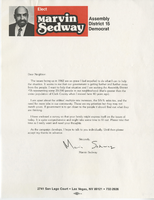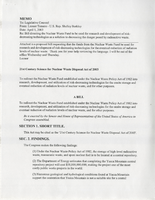Search the Special Collections and Archives Portal
Search Results

Emmanuel Ortega oral history interview: transcript
Date
Archival Collection
Description
Oral history interview with Emmanuel Ortega conducted by Monserrath Hernandez, Maribel Estrada Calderon, Elsa Lopez, Barbara Tabach, and Laurents Bañuelos Benitez on 2019 for the Latinx Voices of Southern Nevada Oral History Project. Emmanuel Ortega was born in Artesia, California and was raised in Ciudad Juárez, Mexico before moving to El Paso, Texas with his family at the age of thirteen. In 1998 his family relocated once again from El Paso to Las Vegas, Nevada where his father joined the Carpenters Union. They settled in Green Valley and he began attending a hybrid community college and high school program allowing him to obtain college credits. He continued at the College of Southern Nevada for two more years where he was a photography major and later transferred to the University of Nevada, Las Vegas (UNLV) where he studied art history. He moved back to Las Vegas in 2011 where he began teaching at UNLV and received a PhD in Ibero-American colonial art history from the University of New Mexico in 2017. He is the co-host of the podcast "Latinos Who Lunch" where hosts discuss pop culture, art, and issues of race, sex, and gender in the Latinx community.
Text
Roger D. Foley Papers on United States v. Cappaert
Identifier
Abstract
The Roger D. Foley Papers on United States v. Cappaert are comprised of materials collected by District Judge Roger D. Foley while performing his duties as judge in
Archival Collection
Kane Springs Ranch Records
Identifier
Abstract
The Kane Springs Ranch Records (1930-2005) contain materials related to the Kane Springs Ranch in Meadow Valley Wash outside of Moapa, Nevada. The collection primarily focuses on the property itself, but also contains a genealogy of the Huntsman family, the ranch's first owners. Records include deeds and materials from the sale of the Kane Springs Ranch to the Bureau of Land Management in 2005. The bulk of the collection documents how the Bradley Stuart family used its resources from 1952 to 2003. These materials are related to water usage on the property and a rock and sand mining operation.
Archival Collection
John Ponticello Papers
Identifier
Abstract
The John Ponticello Papers are comprised of materials related to Ponticello's experiences in Las Vegas, Nevada between 1956 and 1971 with an emphasis on his Research Gambling Game Project, which he conducted and published between 1968 and 1971. The collection includes materials regarding gaming licenses and applications, research agreements, descriptions of the project, and publications about the research project. Also included are materials from Ponticello's experiences in Las Vegas such as business cards, county work cards, and souvenir photographs.
Archival Collection
Celesta Lowe oral history interview
Identifier
Abstract
Oral history interview with Celesta Lowe conducted by Patrick W. Canlton on February 06, 2002 for the Boyer Early Las Vegas Oral History Project. Lowe begins by discussing her early life in Baker, California and her father’s role as a station agent for the Tonopah Tidewater Railroad during the 1920s and 1930s. Lowe then describes her family moving to Las Vegas, Nevada in the 1940s. Lowe chronicles the process state legislatures took to open Nevada Southern University in 1957 and her role as an administrative assistant in the main office of the school. Lowe recounts her career at Nevada Southern University, the expansion of the campus, and renaming it University of Nevada, Las Vegas. Lastly, Lowe talks about her switch from an administrative assistant to a librarian at UNLV.
Archival Collection
Larry Ruvo oral history interview
Identifier
Abstract
Oral history interview with Larry Ruvo conducted by David G. Schwartz on January 27, 2009 for the Remembering Jay Sarno Oral History Project. Ruvo begins by discussing his position as a front desk clerk at Caesar’s Palace in Las Vegas, Nevada in the 1970s. Ruvo then describes how Jay Sarno changed the casino industry by designing Caesar’s Palace with a single theme. Ruvo then chronicles how gaming gradually was legalized in more areas throughout the world and how Sarno capitalized on making Caesar’s Palace an iconic casino which made people want to travel to Las Vegas. Lastly, Ruvo discusses Sarno’s focus on offering both gaming and entertainment options for guests at Caesar's Palace.
Archival Collection




